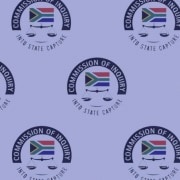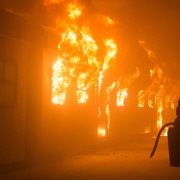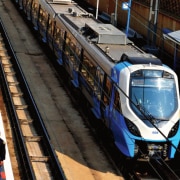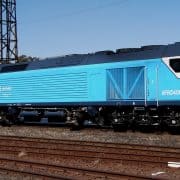|
Getting your Trinity Audio player ready...
|
If ever there was a campaign for how not to run a parastatal, the Passenger Rail Association of South Africa (Prasa) would be the poster child. In the current narrative of how the country’s state-owned entities can be better run to avoid multi-million rand losses due to poor management, Prasa is one of the talking points of the nation right now. The rail agency is embroiled in a messy multi-billion-rand lawsuit against its local supplier Swifambo Rail Leasing, part of Swifambo Holdings.
Swifambo is a provider of railway technology such as passenger and freight vehicles, and was appointed in 2012 to supply 70 locomotives to Prasa as part of the latter’s fleet renewal programme. The arrangement went sour with Swifambo not even halfway through supplying this quantity. But this is just one part of the saga.
The situation is mind-boggling in complexity and scale. Several investigations into and suits against various people have arisen from it.
Prasa is the state’s rail agency, responsible for delivering rail services for both long and short distance to South African passengers. In 2012 bids were opened for a supply of around 7 220 items of rolling stock to replace the current fleet, much of which is outdated and well past its life span. The fleet renewal programme was to span two decades and was intended to be the catalyst for the revitalisation of the public transport division Metrorail and indirectly, the economy.
The locomotive tender, worth R3.5-billion, was awarded to Swifambo, while the Gibela Rail Transport Consortium was appointed to supply 3 600 new Metrorail coaches over 10 years, in a R51-billion deal. Delivery of the trains was planned to start from 2015. But in July 2015 Rapport revealed that the Afro 4000 locomotives which were to have been supplied, were too high for some sections of the country’s railways – the maximum permissible height for diesel locomotives is 3 965mm while the Afros, built in Spain by Swifambo partner Vossloh España, are 4 264mm high.
Prasa vigorously denied this unsuitability, with former CEO Lucky Montana claiming that the newspaper had got everything wrong and that the new equipment actually exceeded the safety standards. He also claimed that the newspaper erred in its headline when it called the deal “the biggest tender blunder”. Rapport has since been vindicated by Prasa’s own actions in the courtroom as it seeks to return the locomotives and recoup its money.
Senior Transnet engineers have stated that they warned Prasa more than once that the trains were unsuitable for our infrastructure, but were ignored.
Of the latest development, Prasa spokesperson Victor Dlamini said: “Thirteen of the locomotives were delivered and we’re already not using them since we approached the court to set aside the entire contract. But in terms of this civil matter what we are asking is that of the money that we have paid we would like all of it back.”
Although it is spending freely, the rail company is not excelling on the financial side either. Its 2015-16 annual report shows R4.1-billion in irregular expenditure and another R9.8-billion which relates to previous years. as well as advance payments of R1.9-billion for the locomotives, the auditor-general has revealed. Kimi Makwethu also said that contracts were awarded to companies that did not meet the requirements, and that use of unauthorised credit cards, which had been obtained against Treasury regulations, was noted.
“Effective steps were not taken to prevent irregular, fruitless and wasteful expenditure, as required by section 51(1)(b)(ii) of the PFMA,” Makwethu said.
In August Prasa appeared before the parliamentary committee on transport, which was also not impressed with the rail provider’s performance.
The entity’s woes extend beyond the rolling stock saga, though. It was recently caught up in a dispute with two security companies, to which it reportedly owed R7-million. In September the sheriff attached seven carriages in lieu of around R2.3-million owed to one company. The other company also filed an urgent application to compel Prasa to pay for services rendered.
The Western Cape High Court ordered Prasa to pay the money by mid-September. The rail company has since settled the debt and the impounded items have been released. This is reportedly not the first time Prasa has made late payments to security companies and other suppliers.
A deliberate and costly error
The Swifambo case sees Prasa trying to send back the 13 items of rolling stock it has received to date and recoup the R2.65-billion it has already paid, in 10 tranches over two years, for the 70 Afro 4000 locomotives. The civil case was filed in June.
Not only that, but Prasa had brought an earlier suit against Swifambo in an effort to review and cancel the contract entirely. In November 2015 Prasa chairperson Popo Molefe asked the South Gauteng High Court in Johannesburg to scrap the deal. The court papers reportedly contained allegations of collusion by Prasa executives in the tender process.
The rail company is asking the court to review and set aside the contract on the grounds of “alleged fraud, corruption and gross irregularities” which were identified by the auditor-general as well as the then public protector, in her August 2015 investigation report titled Derailed. The decision to award the tender to Swifambo, says Molefe in the court papers, was “taken in bad faith” and for the “ulterior purpose or motive of favouring Swifambo”.
Prasa is also using as motivation for the case the fact that Swifambo did not meet one of the key conditions for winning the tender. It was supposed to have produced a performance bond – issued by a bank or other financial institution to guarantee the fulfilment of a particular contract – of R350-million within 28 days of the signing of the contract. It has not done so. Instead, Prasa noted in its court papers, it produced nine separate bonds totalling a lower amount, three months later. This, Prasa argues, is enough to render the contract null and void.
Responding to the November review application, Swifambo described itself as an innocent tenderer, implying that it has been caught up in the machinations of Prasa and Vossloh.
Criminal activities
But more than just the engineering blunder, there are ongoing allegations of bribery and corruption in the deal, revealed in Molefe’s court papers. The papers were filed in answer to an earlier answering affidavit by Swifambo to the bid by Prasa to have the R3.5-billion contract set aside. Swifambo had until mid-July to respond to this case.
Molefe’s affidavit implicated the ANC in corruption involving the party and Angolan businesswoman Maria Gomes, who is said to be a friend of President Jacob Zuma and also appeared to be friendly with Montana. Molefe alleges that Swifambo’s MD Auswell Mashaba diverted some R80-million of the money paid to Swaifambo to Similex, a company of which Gomes is a director, and to lawyer George Sabelo who is a business partner of Zuma’s son Edward. From here the money would be distributed to ANC accounts. The affidavit includes supporting documents such as financial evidence of the money transfers.
The ANC has rejected the allegations, saying in a statement that it had “not received any such funds from the companies concerned and condemns in the harshest possible terms rumour-mongering and the use of the name of the organisation between individuals in their personal deals with no mandate from the party.”
In a statement released as far back as July 2015, the EFF alluded to irregular goings-on. “We have reason to suspect that bribes may have been exchanged in the cheerful procurement of these ‘defective’ locomotives from a company that was found guilty of price collusion in Germany in 2012.” And in September the DA laid criminal charges against Prasa relating to the bribery allegations.
The Hawks are currently investigating the affairs at Prasa, but have reportedly assigned just one investigator to handle the enormous task. The investigator, a career policeman with the rank of colonel and a background in cybercrime, is handling other cases besides Prasa. This seems to be a deliberate attempt to keep the investigation going at a snail’s pace, former police officer and Unisa lecturer in policing Rudolph Zinn is reported as saying.
Dodgy employees
Montana himself was not long for the agency. He had already resigned at the beginning of June 2015 but was required to work a six-month notice period which was extended to the end of March 2016. However he left in mid-July after the Prasa board agreed to accelerate the resignation process. He had been implicated in improper tender procedures, maladministration, corruption, conflicts of interest, financial mismanagement, nepotism and the improper handling of whistle-blowers.
In Derailed, former public protector Thuli Madonsela found that a significant number of the allegations against Montana were substantiated and that in these cases his behaviour amounted to maladministration, and unethical and improper conduct. She also noted a culture of non-compliance with procurement procedures, as well as one of either poor information management or concealment of information, and recommended an investigation by the Treasury and Prasa into all contracts awarded since 2012 exceeding R10-million. The Hawks are continuing to investigate Montana.
Chief Engineer Daniel Mtimkulu was fired from Prasa after it emerged that he had lied about his qualifications. He was to face a disciplinary inquiry but resigned a week after he was suspended. The agency did not immediately accept his resignation but went ahead with the inquiry and fired him in absentia.
Molefe has described Montana and Mtimkulu as the masterminds behind the locomotive scandal.
Links to the arms deal
As recently as September news broke of a link – via one of Prasa’s shareholders – to South Africa’s controversial arms deal of several years ago. Maydex AG, a Swiss company based in Zurich, is a former shareholder of New Africa Rail (NAR), the BEE partner in the Prasa tender of French company Alstom, which owns a majority stake in Gibela. NAR’s share of Gibela amounts to 9%. Maydex’s shares were bought by technology firm EOH for a reported R16.5-million.
Patrick Landau, 100% shareholder of Maydex, has been implicated in a bribery scandal involving Italian oil and gas giant Eni, which had engaged Maydex to do lobbying work in various countries. He has also been implicated in corruption of his own – the Italian newspaper Il Fatto Quotidiano reported that Landau was linked to corruption and bribery in contracts awarded to Italian construction multinational Impregilo.
The publication also revealed that Landau was a good friend of Sir Richard Evans, former chairperson of BAE Systems, and is said to have done lobbying work for BAE as well. BAE, of course, supplied the South African Air Force with Hawk 100 lead-in fighter trainers and Jas 39 Gripen advanced light fighters.
This is the same arms manufacturer that in December 2010 was found by the British Serious Fraud Office to have questionably paid R280-million to Fana Hlongwane, special adviser to former defence minister Joe Modise.
Il Fatto Quotidiano further revealed that Landau was involved in an arms contract between Italian arms multinational Finmeccanica and the Israeli government. One of Finmeccanica’s subsidiaries is AgustaWestland, which supplied helicopters to the South African Air Force.
Landau became involved with the Prasa tender through his consultancy work with Alstom.
• Image from Wikipedia.








